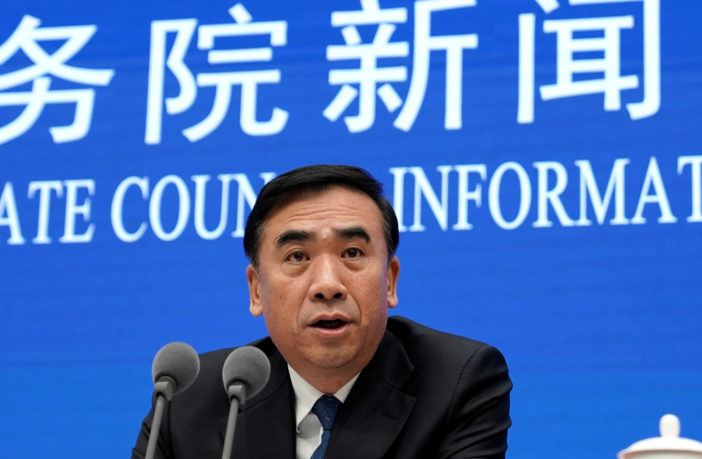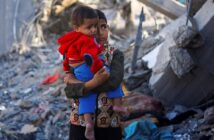The death toll from a new flu-like coronavirus in China rose to nine on Wednesday with 440 confirmed cases, Chinese health officials said as authorities stepped up efforts to control the outbreak by discouraging public gatherings in Hubei province.
Another 2,197 people who came into contact with infected people were isolated, with 765 so far released from observation, National Health Commission vice-minister Li Bin told reporters, adding that there was already evidence that the virus was being spread through “respiratory transmission”.
“Recently there has been a big change in the number of cases, which is related to our deepening our understanding of the disease, improving diagnostic methods and optimising the distribution of diagnostic kits,” Li said.
As China vowed to tighten containment measures in hospitals, the World Health Organization (WHO) was due to hold an emergency meeting on Wednesday to determine whether the outbreak of the new coronavirus constitutes a global health emergency.
The virus, originating in the central Chinese city of Wuhan in Hubei at the end of last year, has spread to Chinese cities including Beijing, Shanghai and Macau, as well as the United States, Thailand, South Korea, Japan and Taiwan.
The Chinese government has been providing daily updates on the number of cases in a bid to head off public panic, as millions of people prepare to travel domestically and abroad for the country’s Lunar New Year celebrations starting this week.
“At present, during the Lunar New Year, the rise in the mobility of the public has objectively increased the risk of the epidemic spreading and the difficulty of prevention and control,” Li warned, noting that the mutation of the virus could also bring further risks.
Terry Gou, the billionaire founder of Apple supplier Foxconn, said on Wednesday he was advising company employees not to visit China over the coming Lunar New Year holiday, amid concerns over the virus.
Fears of a pandemic similar to the Severe Acute Respiratory Syndrome (SARS) outbreak that started in China and killed nearly 800 people in 2002-2003 have roiled global markets, with aviation and luxury goods stocks hit particularly hard and the Chinese yuan tumbling.
On Tuesday the death toll stood at six with about 300 confirmed cases.
WHO SAYS MORE CASES EXPECTED
WHO spokesman Tarik Jasarevic said new cases of the coronavirus would appear as China stepped up monitoring.
Li said there was as yet no evidence of “super-spreaders” capable of disseminating the virus more widely, as happened during the SARS outbreak.
Fifteen medical personnel are among those infected in China. Symptoms include fever, coughing and difficulty breathing. The viral infection can cause pneumonia and be passed from person to person.
Though the origin of the virus has yet to be identified, WHO said the primary source was probably animal. Chinese officials have linked the outbreak to Wuhan’s seafood market.
The new virus was adapting and mutating, underscoring the challenges for health authorities in controlling the outbreak, Gao Fu, the director-general of China’s Centre for Disease Control and Prevention, told a news briefing.
Officials found to have covered up infections would be a “sinner for eternity before the Party and the people”, the Chinese Communist Party’s Central Political and Legal Commission said in a post on its WeChat social media account that was subsequently deleted.
Taiwan President Tsai Ing-wen called on China on Wednesday to share “correct” information about a new coronavirus and for the WHO not to exclude Taiwan from collaboration on the outbreak for political reasons.
Taiwan is not a member of the WHO due to the objection of China, which considers the island a Chinese province with no right to participate in international organisations unless it accepts it is part of China.
Taiwan on Tuesday confirmed its first case of the coronavirus, a woman returning to Taiwan from Wuhan.
Taiwan joined Australia in warning citizens to avoid travel to Wuhan, and airports around the world have stepped up screening of travellers from China. Tsai also ordered tour groups from Wuhan not to come to Taiwan for the time being.
The Chinese-ruled gambling hub of Macau confirmed on Wednesday its first case of pneumonia linked to the newly identified coronavirus and tightened body-temperature screening measures in casinos and around the city.
Several foreign tour operators said North Korea will ban foreign tourists starting Wednesday due to the spread of the virus.
The vast majority of tourists to North Korea come from China, Pyongyang’s main supporter. North Korea is estimated to earn millions of dollars from the steady flow of Chinese tourists. Tourism is one of the last major ways that North Korea can legally earn foreign cash due to international sanctions.
VIRUS IMPACTS OLYMPICS QUALIFYING
Qualifying boxing matches for Asia and Oceania region for the 2020 Olympic Games in Tokyo set to take place in Wuhan in February have been cancelled due to fears over the virus, Japan’s Kyodo news agency said on Wednesday.
However, the Australian women’s soccer team, the Matildas, were still preparing for a trip to Wuhan for Olympic qualifiers early next month, head coach Ante Milicic has said.
Hong Kong’s Cathay Pacific Airways Ltd, one of the airlines affected the most by the SARS outbreak, said it would allow flight attendants to wear a surgical mask while operating mainland China flights due to concerns over the new virus.
The Cathay Pacific Airways Flight Attendants Union said it had received a “tremendous” amount of messages from members concerned over catching the virus, and attendants on all flights should have the option to wear a mask.
“All of them are worried about the risk they are taking every time they go to work,” the union said on its Facebook page.
Cathay’s website said that with immediate effect, rebooking, rerouting and refund charges would be waived for all tickets arriving to or departing from Wuhan through Feb. 15.
China’s aviation regulator late on Tuesday told mainland carriers to refund or change flights to Wuhan without charge at the request of passengers, which analysts at Daiwa said had affected more than 24 airlines.
Some other travel firms are also allowing free cancellations on bookings to Wuhan.




